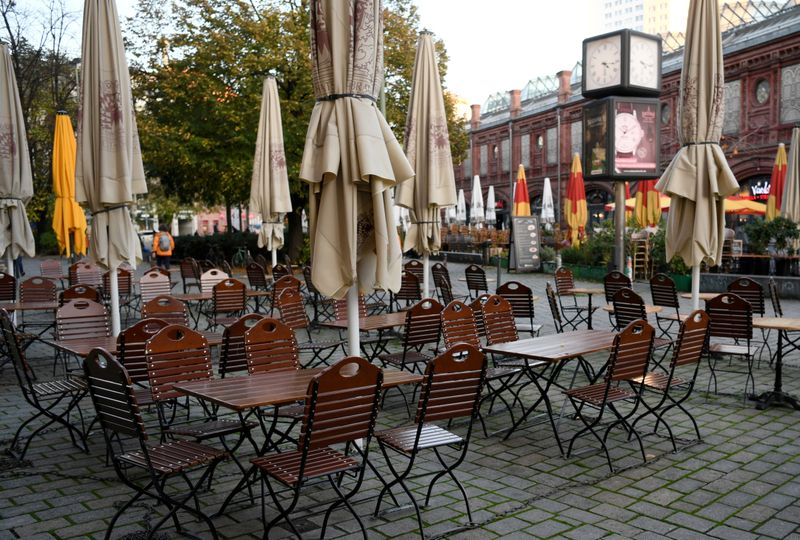By Jonathan Cable
LONDON (Reuters) - Euro zone economic performance far exceeded expectations this month - although it still contracted slightly - as a second wave of coronavirus infections and renewed lockdowns had less of an impact than earlier in the year, a survey showed.
Manufacturers reported strong growth, fuelled by rising exports and a booming performance from Germany, but the services industry remained in decline as social distancing restrictions were kept in place.
IHS Markit's flash composite PMI, seen as a good guide to economic health, soared to 49.8 in December from November's 45.3, just shy of the 50 mark separating growth from contraction. A Reuters poll had predicted a much shallower rise to 45.8.
"The decent rebound in the composite PMI primarily reflects the partial lifting of restrictions in France and provides some hope that euro zone GDP won't fall quite as much in Q4 as feared," said Jessica Hinds at Capital Economics.
"But with tougher measures now being imposed in Germany, the big picture is that services activity in the region will remain weak for a while yet, holding back the economic recovery."
A Reuters poll earlier this month said the economy would contract 2.6% this quarter. [ECILT/EU]
Germany's private sector showed resilience as manufacturing picked up steam and services partly recovered, a sister survey showed, while in France activity unexpectedly returned almost to growth this month as some restrictions were eased.
But German Chancellor Angela Merkel and state leaders have agreed to shut most stores and schools from Wednesday until at least Jan. 10 and although France's lockdown officially ended on Tuesday cafes, restaurants and cultural venues remain closed and some restrictions in place.
Meanwhile in Britain, which has suffered the second highest COVID-19 death toll in Europe, the economy limped back to growth but hospitality businesses struggled and Brexit disruption hit factory supply chains.
Britain faces the added headache that a post-Brexit transition period finishes at the end of the year and Prime Minister Boris Johnson has so far been unable to agree on a future relationship with the European Union.
A Reuters poll earlier this month said the economy would shrink 2.7% this quarter and take at least two years to reach pre-COVID-19 levels. [ECILT/GB]
SHOT IN THE ARM
The PMI covering the bloc's dominant service industry bounced to 47.3 from 41.7, exceeding all expectations in the Reuters poll that had instead predicted a modest increase to 41.9.
With activity still in decline, and restrictions likely to be in place for some time yet, services firms cut headcount again this month, as they have since Europe began to feel the full brunt of the pandemic in March.
The employment index held below breakeven at 49.4, albeit better than November's 48.2.
Factories have been less affected by lockdown measures as many remained open, and the flash manufacturing PMI jumped to 55.5 from 53.8, its highest since May 2018 and also above all expectations in a Reuters poll with a median prediction of 53.0.
An index measuring output, that feeds into the composite PMI, rose to 56.6 from 55.3.
Strong demand for manufactured goods meant factories built up a solid backlog of work, with the sub-index rising to 56.2 from 54.3, its highest in nearly three years.
And with hopes vaccines being rolled out will allow some return to normality, optimism was at its highest since April 2018. The composite future output index rose to 63.8 from 60.4.
"The recent positive news on the vaccine front have contributed to an improvement in business expectations," said Nicola Nobile at Oxford Economics.
"But while we certainly welcome this news, the short term outlook is still clouded with risks, in particular in relation to the extension of the containment measures."

